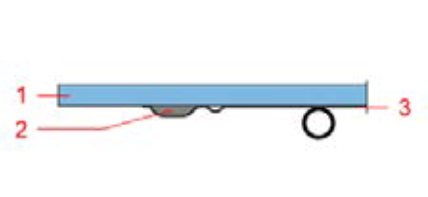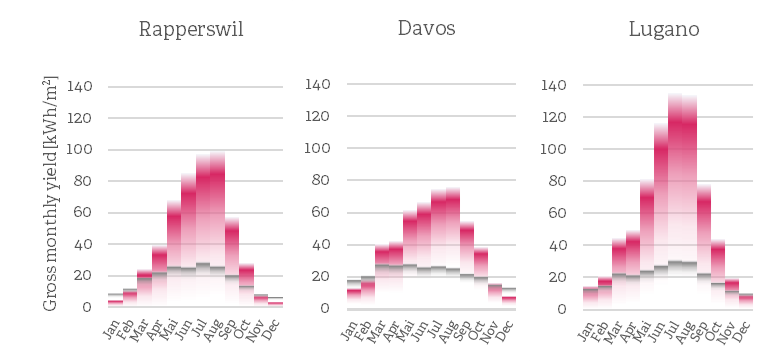DeCarbCH Wiki Technologies - Solar Energy
Parabolic Trough Collector
Photovoltaic Thermal (PVT) collectors are a type of solar technology that combines the benefits of photovoltaic (PV) panels and solar thermal collectors. PVT collectors generate both electricity and low grade thermal energy, therefore they are suitable to be integrated in low temperature or “anergy” grids providing energy in the temperature range of 10-40°C. A typical application is to regenerate large borehole fields.
Most of the commercially available uncovered photovoltaic thermal collectors consist of a front cover similar to a conventional PV module with a thermal absorber on the backside. Some products use the absorber also as heat exchanger with the ambient air to source heat pumps. They cannot normally reach temperatures above 70°C because they have no insulation.

For the typical application of regenerating geothermal boreholes, thermal outputs in the range of 300-400 kWh/m2 can be expected in Switzerland, however the output of uncovered PVT collectors is strongly dependent on the operation temperature. Covered PVT collectors for higher temperature applications are part of ongoing research and development.
Typical monthly performance for electricity (grey) and thermal energy (pink) of PVT in Switzerland.
The main application of PVT collectors is the regeneration of geothermal borehole fields connected to buildings, building complexes or districts supplied by low temperature networks. Switzerland is a pioneer in this technology and therefore the largest solar thermal installation in Switzerland is the 3500 m2 PVT field connected to the low temperature network at "Suurstoffi” in Rotkreuz.
Advantages
Construction
Most of the commercially available uncovered photovoltaic thermal collectors consist of a front cover similar to a conventional PV module with a thermal absorber on the backside. Some products use the absorber also as heat exchanger with the ambient air to source heat pumps. They cannot normally reach temperatures above 70°C because they have no insulation.

- PV-Module
- Bonded joint
- Absorber
Performance
For the typical application of regenerating geothermal boreholes, thermal outputs in the range of 300-400 kWh/m2 can be expected in Switzerland, however the output of uncovered PVT collectors is strongly dependent on the operation temperature. Covered PVT collectors for higher temperature applications are part of ongoing research and development.

Swiss and International Market
The main application of PVT collectors is the regeneration of geothermal borehole fields connected to buildings, building complexes or districts supplied by low temperature networks. Switzerland is a pioneer in this technology and therefore the largest solar thermal installation in Switzerland is the 3500 m2 PVT field connected to the low temperature network at "Suurstoffi” in Rotkreuz.
Advantages
- Generate thermal and electrical energy
- Low stagnation temperatures, no overheating protection needed
- Cooling provides slightly higher electrical output of PV part
- Only for low temperature applications
- Low thermal output at low outdoor temperatures/in winter